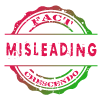
Chemicals used as additives in food and other consumable products have remained a matter of concern for consumers. Recently, social media users were seen raising concern over the use of Titanium Dioxide in one of the favorites bubble gum brands called ‘Bazooka’.
Users are claiming that Bazooka Bubble Gum contains Titanium Dioxide, a high-risk additive which causes damage to DNA cells, intestinal inflammation and accumulates in various organs. This additive has been banned by European Union in 2022.
However, Fact Crescendo found the claim to be misleading. Titanium Dioxide is an additive approved by FDA, WHO and other food safety regulatory bodies.
Fact Check-
First, we checked if Bazooka Bubble Gum really has Titanium Dioxide as an ingredient. We found out that Bazooka bubble gum contains Titanium Dioxide as one of the active ingredients.
What Is Titanium Dioxide?
Titanium Dioxide (TiO2) is a naturally occurring inorganic material that is mined from the earth and then processed and refined before it is used. It exists as a white and powdery solid substance. It is used as a white pigment for paints, in the food industry as a coloring agent, in sunscreens and cosmetics. It is also used by pharmaceutical companies for manufacturing gelatin capsules, tablet coatings and syrups.
We found that the US Food and Drugs Administration (FDA) has allowed the use of titanium dioxide as a color additive in foods according to the specifications and conditions. According to FDA regulations the quantity of titanium dioxide should not exceed 1% by weight of the food. You can read the details here.
According to the National Library of Medicine, titanium dioxide, also known as E171, has been accepted by food industries as additives mainly for whitening and textures. It is also used in oral medicines and it is considered safe and non-toxic in small amounts. Although tiny particles of TiO₂ are commonly used in food and medicine, there isn’t much information about how they affect the body or where they go after being swallowed.
On 24 November 2023, World Health Organization (WHO) and the Food and Agriculture Organization (FAO) Joint Expert Committee on Food Additives (JECFA) released an assessment of the health impacts of titanium dioxide. According to the report, TiO₂ is poorly absorbed in the gastrointestinal tract. JECFA found no evidence of carcinogenic, reproductive, or developmental toxicity effects from long-term exposure to TiO₂.
However, some concerns were there for the genotoxicity of TiO₂ nanoparticles. JECFA highlighted the limitations of current testing methods, which may not be suitable for nanoparticles. Despite some uncertainties, JECFA reaffirmed the Acceptable Daily Intake (ADI) for TiO₂ as “not specified,” maintaining its safety for use in food.
Apart from this, we also found that EFSA reviewed scientific evidence and found that titanium dioxide (TiO₂) particles might cause genotoxicity (damage to DNA). Because of this concern, EFSA no longer considers TiO₂ (E171) safe as a food additive and cannot set a safe daily intake. This evaluation only applies to its use in food, not other applications.
According to a report, The Court of Justice of the European Union in 2022, cancelled the European Commission’s decision to label titanium dioxide (TiO₂) as a possible carcinogen. The court found that the scientific study used to justify this decision was flawed because it didn’t account for how TiO₂ particles clump together, which changes how they behave in the lungs. It also ruled that TiO₂ doesn’t naturally have the ability to cause cancer; the risk only appears in specific situations, like inhaling large amounts of fine particles. Since the decision was based on these errors, the court said the classification was a mistake and overturned it.
Conclusion:
Fact Crescendo found the claim to be misleading. Although EFSA concluded that Titanium Dioxide is not safe, but FDA, WHO and National Library of Medicine had declared it as a safe food additive when used under prescribed limit.

Title:Titanium Dioxide in Bazooka Bubble Gum is approved by FDA. Viral claim is misleading
Written By: Siddharth SahuResult: Misleading


